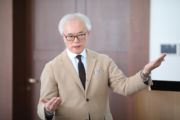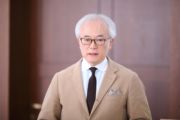Japanese Prime Minister’s Foreign Policy Adviser Tomohiko Taniguchi holds lecture in the House of Wisdom
Professor Taniguchi Tomohiko, adviser to the Cabinet of Japanese Prime Minister Shinzo Abe visited Budapest at the invitation of the PAIGEO Foundation. During his stay in Hungary, he gave lectures at Corvinus University of Budapest and in the House of Wisdom, among other places. His lectures were attended by students of Corvinus University and the Doctoral School of Geopolitics of the University of Pécs as well as many interested guests.
Tomohiko Taniguchi is not only well-versed in foreign policy and speech writing, but, as a Professor at Keio University, he also holds courses in international political economics and diplomacy. In his lecture in the House of Wisdom, he talked about the common perception of the Japanese people and the true characteristics of the Japanese nation. Starting from this perspective, he analysed the current challenges of the country and nation, grouped into three main issues.
The problem of the widening demographic gap and ageing society is very common in the world today. Their negative effects present many challenges in Japan as well. Professor Taniguchi expressed concern about the unwillingness of Japanese young people to raise children. Although more and more foreigners choose Japan as their home, their difficult integration into society also causes many problems for Japan. It is a problem also because many of them could fill vacant positions in the labour market which the Japanese society is no longer able to. As an example, he mentioned that Filipinos often work in health care and as nurses, which can, in fact, help the ageing population. One of the obstacles regarding integration is language, which Professor Taniguchi considers at least as difficult for foreigners to learn as Hungarian. What is more, most of the Japanese don’t speak English as well as Hungarians do. The third challenge is to establish and maintain good relations with neighbouring states and, more precisely, those along sea routes, as Japan is an island state and its raw material supply heavily depends on the maritime commercial network.
In his lecture at Corvinus University of Budapest, the Professor talked about the success of Abenomics, bearing Prime Minister Shinzo Abe’s name, as well as the Womenomics plan, named after this, which aims to facilitate the employment and parenthood of women. Japan has recognised that declining work force is one of the reasons why women cannot access the labour market, or even if they do, their chances are bad. The goal of Womenomics is to raise the rate of employed women to 30% by 2020. Tomohiko Taniguchi believes that the fact that Prime Minister Shinzo Abe has been leading the country for a long time, since 2012, has contributed to the nation’s economic success as great changes, in his opinion, require generations, not years.
Answering questions at the end of the lectures, the Professor also talked about the difficulties of preparing a speech, such as working late hours or wording the right messages. The Professor’s job in the Prime Minister’s Office includes preparing speeches for Prime Minister Shinzo Abe. After his 20-year-long career at the Nikkei Business magazine, he joined the Ministry of Foreign Affairs of Japan as Deputy Press Secretary and Deputy Director-General for Diplomacy. Three years later, he pursued his career in the English-language press and wrote speeches for Foreign Minister Taro Aso and other national leaders so he is recognised as an experienced and, he claims, perhaps the oldest speech writer in the profession. Furthermore, Tomohiko Taniguchi has over 20 years of experience in journalism, and he has appeared many times, on more than 250 occasions in different programmes on BBC, Al-Jazeera, CNN, and CNA.
Author: Henrietta Hegyi









































